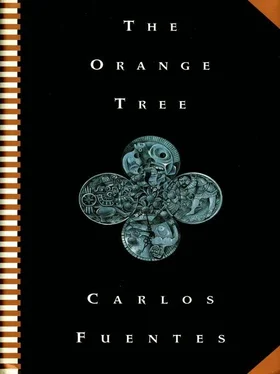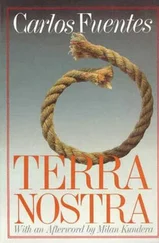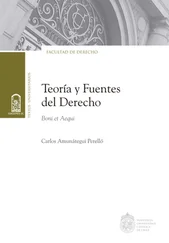Alvarado then confronted Cortés: “Why are you wasting so many words? Either we take him prisoner or we run him through.”
Once again, it was the interpreter Doña Marina who decided the struggle, forcefully advising the king: “Lord Moctezuma, what I recommend is that you go with them now to their dwelling without making a sound. I know they will honor you as the great lord you are. If you do otherwise, you will be put to death.”
You understand that the woman said these things to the emperor on her own initiative, not translating Cortés but speaking Moctezuma’s Mexican language fluently. The king looked like a cornered animal, but instead of shifting around on four legs he staggered on his own two feet. He offered his sons as hostages. He repeated these words several times: “Do not dishonor me in this way. What will my principal men say if they see me taken prisoner? Anything but this dishonor.”
Was this pusillanimous creature the great lord who had subjugated all the tribes from Xalisco to Nicaragua through terror? Was this the cruel despot who one day ordered that those who dreamed about the end of his reign be put to death so that the dreams would die with the dreamers? I can only understand the enigma of Moctezuma’s weakness before the Spaniards by using words as an explanation. Called Tlatoani, or Lord of the Great Voice, Moctezuma was slowly but surely losing his control over words — more than his control over men. I think that novelty disconcerted him, and Doña Marina had just proven, by arguing with him face-to-face, that the words of the king were no longer sovereign. Therefore, neither was he. Others, the foreigners, but also this treacherous woman from Tabasco, owned a vocabulary forbidden to Moctezuma.
In this second opportunity that stood between things said, things done, and the unforeseeable consequences of both, I saw my own opportunity. That night, under a mantle of secrecy, I spoke to the king in Mexican and told him privately about the dangers threatening the Spaniards. Did Moctezuma know that the governor of Cuba had sent an expedition to arrest Cortés, whom he considered a vile rebel who acted without authorization and who was worthy of being imprisoned instead of making a prisoner of such a great lord as Moctezuma, the equal only of another king, Don Carlos, whom Cortés, with no credentials, sought to represent?
I repeat these words as I said them, in one rush, without taking a breath, with no shade of meaning, no subtlety, hating myself for my betrayal but, above all, for my inferiority in the arts of dissimulation, trickery, and dramatic pauses, in which my rivals, Cortés and La Malinche, were masters.
I ended as abruptly as I’d begun, getting, as they say, right to the point: “This expedition against Cortés is led by Pánfilo de Narváez, a captain as bold as Cortés himself, but with five times as many men.”
“Are they also Christians?” asked Moctezuma.
I said they were, and that they represented King Carlos, from whom Cortés was fleeing.
Moctezuma patted my hand and offered me a ring as green as a parrot. I gave it back and told him that my love for his people was reward enough. The king looked at me without understanding, as if he himself had never understood that he led a group of human beings. I asked myself then and I ask myself now, what kind of power did Moctezuma think he had and over whom? Perhaps he was only acting out some pantomime in front of the gods, wearing himself out in an effort to hear them and to be heard by them. But what was exchanged there was neither jewels nor pats on the hand but words, words that could give Moctezuma more power than all the horses and harquebuses the Spaniards possessed, if the Aztec king would only decide to speak to his men, his people, instead of speaking to the gods, his pantheon.
I told the king the secret of Cortés’s weakness, just as Doña Marina had given Cortés the secret of Aztec weakness, the discord, the envy, the struggle between brothers, which affected Spain just as much as Mexico: one half of the country perpetually dying of the other half.
[6]
Thus I associated myself with the hope of an Indian victory. All my acts, you’ve already guessed and I can tell you right from my intangible shroud, were directed toward that goal: the triumph of the Indians over the Spaniards. Once again, Moctezuma let opportunity slip through his fingers. He got ahead of events, boasting in the presence of Cortés that he knew Cortés was threatened by Narváez instead of hastening to join forces with Narváez against Cortés, to defeat the man from Estremadura, and then to turn the Aztec nation against the fatigued regiment of Narváez. In that way, Mexico would have been saved …
I must say at this point that Moctezuma’s vanity was always stronger than his cunning, although even stronger than his vanity was his feeling that everything was foretold, which was why the king had only to carry out the role set for him by religious and political ceremonial. In the soul of the king, fidelity to forms was its own reward. It had always happened that way, wasn’t that the truth?
I didn’t know how to say it wasn’t, to argue with him. Perhaps my Mexican vocabulary was insufficient, and I didn’t know the subtlest forms of Aztec philosophic and moral reasoning. What I did want was to frustrate the fatal plan, if such a thing existed, by means of words, imagination, lies. But when words, imagination, and lies jumble together, the result is the truth …
The Aztec king was hoping Cortés would be beaten by the punitive expedition sent by the governor of Cuba, but he did nothing to hasten the defeat of our captain. His certainty was understandable. If Cortés, with only five hundred men, had defeated the chiefs of Tabasco and Zempoala as well as the fierce Tlaxcaltecs, wouldn’t more than two thousand Spaniards also armed with fire and horses defeat him?
But the cunning Cortés, accompanied by his new Indian allies, defeated Narváez’s people and captured their leader. Observe the irony of this matter: now we had two prisoners of importance, one Aztec and the other Spanish, Moctezuma and Narváez. Was there any limit to the number of our victories?
“The truth is, I don’t understand you,” the Great Moctezuma, sequestered but quite at his ease being bathed by his beautiful handmaidens, said to us.
But did we understand him?
This question, reader, obliges me to pause and reflect before events once again rush to their conclusion, always more swiftly than the pen of the narrator, although this time he writes from death.
Moctezuma: Did we understand exactly how alien to him treacherous political machinations were, and how natural, by contrast, was the proximity of a religious world impenetrable to Europeans? Impenetrable for having been forgotten: our contact with God and His primary emanations had been lost for a long, long time. In that, Moctezuma and his people were indeed alike, though neither knew it: the clay of creation, the nearness of the gods, still moistened them.
Did we understand him, sheltered as he was in another time, the time of origins, which for him was current, immediate time, portentous as both refuge and threat?
I compared him to a cornered animal. Instead, this refined man seems to me, now that death has made us equal, not only like the scrupulous individual of infinite courtesies we met when we entered Mexico but like the first man, always the first, amazed that the world exists and that the light advances every day before fading into the cruelty of every night. His obligation consisted in always being, in the name of all, the first man to ask: “Will the sun come up again?”
This was a more urgent question for Moctezuma and the Aztecs than knowing whether Narváez defeated Cortés, Cortés defeated Narváez, the Tlaxcaltecs defeated Cortés, or if Moctezuma would fall before all of them: as long as he didn’t fall before the gods.
Читать дальше












